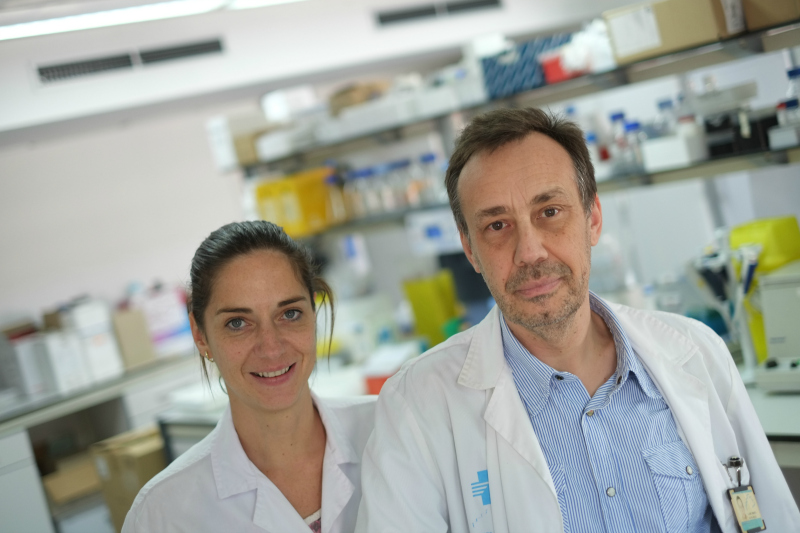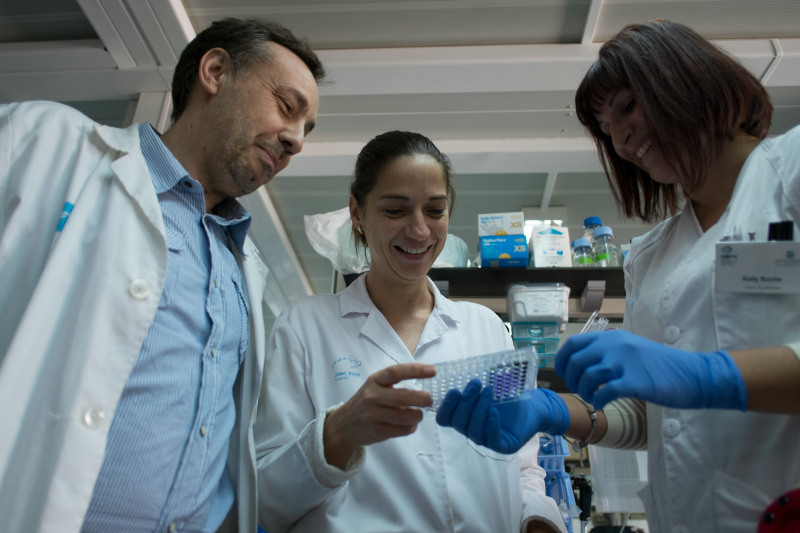18/04/2016
Researchers discover one of the causes of diabetes in people with obesity
Researchers at the URV and the Pere Virgili Health Research Institute (IISPV) have discovered why people with obesity not only accumulate glycogen in their muscles and liver, like other people, but also store it in their adipocytes, the cells that make up body fat. These fat cells stop working properly, causing the individual to develop insulin resistance and, potentially, type 2 diabetes. This is the first time that this metabolic pathway has been described and it makes glycogen a new player within the pathology of obesity

Researchers at the URV and the Pere Virgili Health Research Institute (IISPV) have discovered why people with obesity not only accumulate glycogen in their muscles and liver, like other people, but also store it in their adipocytes, the cells that make up body fat. These fat cells stop working properly, causing the individual to develop insulin resistance and, potentially, type 2 diabetes. This is the first time that this metabolic pathway has been described and it makes glycogen a new player within the pathology of obesity
The body derives glycogen from glucose and stores it for energy. Hitherto it was believed that it only accumulated in the muscles and liver, but now Joan J. Vendrell and Sonia Fernández-Veledo, researchers from the DIAMET research group (Diabetes and Associated Metabolic Diseases) of the Pere Virgili Health Research Institute (IISPV) and professors at the URV, have found that glycogen also accumulates in the adipocytes of people with obesity.
Glycogen build-up in parts of the body other than the muscles and liver has pathological consequences, which is why the researchers believe that it could cause diabetes in people with obesity because when fat cells accumulate too much glycogen they begin to produce substances that are harmful to themselves and to the muscles and liver.
This is similar to the processes that occur in people with Alzheimer’s disease, whose neurones accumulate glycogen and cease to function properly, or patients with diabetic retinopathy, where glycogen start to accumulate in the cells of the retina.
The adipocyte stops functioning properly
This latest study has also found that the glycogen build-up in the fat cells prevents their “sensors” from working properly. That is, fat cells have a form of sensor that helps them to detect if they have energy or not and to act accordingly. In cases of obesity, the fat cell already has a lot of energy because it has accumulated a large number of lipids, but it continues to store more energy in the mistaken belief that it needs it. And they accumulate this energy in the form of glycogen.
The researchers believe that the next step is to identify this “sensor” and to determine whether the malfunctioning of the cell is a cause or consequence of obesity. “We believe that it is a cause, but we cannot be certain at the moment. And in humans it is very difficult to find out because you cannot block a protein in a person”.
They have also demonstrated that less oxygen is able to get to the adipose tissue in patients with obesity because the fat cells are biggePere Virgili Health Research Instituter and there is less space between them. This encourages the build-up of glycogen because the lack of oxygen makes the fat cell believe that it has no energy reserves when in fact the opposite is the case.
Specialised treatment still a long way off
The results of this investigation have demonstrated a new hitherto undescribed metabolic pathway within fat cells and will make an important contribution to increasing our understanding of obesity diseases and diabetes.
However, it will be difficult to apply this highly important medical advance to treatments or to resolving pathologies because “it is difficult to act on a protein or molecule that is specific to this new pathway”, explained Dr Fernández-Veledo, “This new pathway for accumulating glycogen in the cell shares molecules that also control the accumulation of lipids, which are highly important to the organism. Consequently, if we stopped cells from storing glycogen we would also stop them from accumulating lipids”.
For this reason, Dr Vendrell and Dr Fernández-Veledo, who are also members of the Online Biomedical Research Centre into Diabetes and Associated Metabolic Diseases (CIBERdem), state that the next step is to “determine whether this pathway acts on any others”, because “any attempt to prevent the accumulation of glycogen may lead to unintended adverse effects or prevent the accumulation of lipids”. “In the short term this finding will not lead to any significant changes in current treatments, but it is a first step in understanding exactly what is happening and thus it will open up new lines of inquiry”, they added.
Reference: Joan Vendrell, Sonia Fernández-Veledo, Victoria Ceperuelo-Mallafré, Miriam Ejarque, Carolina Serena, Xavier Duran, Marta Montori-Grau, Miguel Angel Rodríguez, Oscar Yanes, Catalina Núñez-Roa, Kelly Roche, Prasanth Puthanveetil, Lourdes Garrido-Sánchez, Enrique Saez, Francisco J. Tinahones, Pablo M. Garcia-Arrobas, Anna Mi Gómez-Foix, Alan R. Saltiel: “Adipose tissue glycogen accumulation is associated with obesity-linked inflammation in humans”. Molecular Metabolism, 01/2016. http://dx.doi.org/10.1016/j.molmet.2015.10.001
More news about: diabetes, Diabetes and metabolic associated diseases research group, IISPV, obesity, Pere Virgili Health Research Institute

